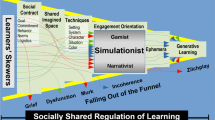Abstract
Providing experiential training in complex tasks on an any-time anywhere basis—whether for individual or team tasks—often requires simulating interaction with non-player characters (NPCs): co-workers, superiors, subordinates, opponents, subjects, stakeholders, consultants, tutors, peers etc.
Simulating all aspects of human behavior is overwhelmingly complex. Pursuing full human simulation is also needlessly costly and distracts from the task at hand, which is providing a learner with prompts and reactions supporting experiences that promote mastery of learning objectives and appropriate transfer. The question then is, What techniques can be used to create relevantly realistic NPC agents to support desired learning outcomes?
Rather than advance a one-size-fits-all silver bullet for instructional system NPC modeling, we advocate a flexibly configurable bag-of-tools approach. Using example systems that the authors have worked on, we discuss several different approaches to building NPCs for pedagogical effect. Choices of technologies to employ should be based on application requirements, considering issues such as: (1) content/authoring costs—both for achieving short term capability and for longer-term maintenance and scalability; (2) pedagogical approaches; and (3) relevant aspects of realism in behavior and interaction methods.
Access this chapter
Tax calculation will be finalised at checkout
Purchases are for personal use only
Similar content being viewed by others
References
Aleven, V., Mclaren, B.M., Sewall, J., Koedinger, K.R.: A new paradigm for intelligent tutoring systems: example-tracing tutors. Int. J. Artif. Intell. Educ. 19(2), 105–154 (2009)
Beaubien, J.M., Baker, D.P.: The use of simulation for training teamwork skills in health care: how low can you go? BMJ Qual. Saf. 13(Suppl. 1), i51–i56 (2004)
Cleary, C., Bareiss, R.: Using points to construct browsing links in ASK systems. AAAI Technical report FS-95-03 (1995)
Domeshek, E., Holman, E., Luperfoy, S.: Discussion control in an automated socratic tutor. In: Proceedings of the Industry/Interservice, Training, Simulation & Education Conference (I/ITSEC 2004) (2004)
Domeshek, E.: Scenario-based conversational intelligent tutoring systems for decision-making skills. In: Proceedings of the Industry/Interservice, Training, Simulation & Education Conference (I/ITSEC 2009) (2009)
Ferguson, W., Bareiss, R., Birnbaum, L., Osgood, R.: ASK systems: an approach to the realization of story-based teachers. J. Learn. Sci. 2(1), 95–134 (1992)
Fredrick, W.C., Walberg, H.J.: Learning as a function of time. J. Educ. Res. 73(4), 183–194 (1980)
Fu, D., Houlette, R.: Putting AI in entertainment: an AI authoring tool for simulation and games. IEEE Intell. Syst. 17, 81–84 (2002)
Karweit, N.: Time-on-task reconsidered: synthesis of research on time and learning. Educ. Leadersh. 41(8), 32–35 (1984)
Kim, J.M., et al.: BiLAT: a game-based environment for practicing negotiation in a cultural context. Int. J. Artif. Intell. Educ. 19(3), 289–308 (2009)
Lajoie, S.P., Lesgold, A.: Apprenticeship training in the workplace: computer-coached practice environment as a new form of apprenticeship. Mach.-Mediated Learn. 3(1), 7–28 (1989)
Leelawong, K., Biswas, G.: Designing learning by teaching agents: the Betty’s Brain system. Int. J. Artif. Intell. Educ. 18(3), 181–208 (2008)
Ludwig, J.R.: Extending dynamic scripting. Doctoral dissertation, University of Oregon (2008)
Ludwig, J., Presnell, B.: Developing an adaptive opponent for tactical training. In: Sottilare, R.A., Schwarz, J. (eds.) HCII 2019. LNCS, vol. 11597, pp. 532–541. Springer, Cham (2019). https://doi.org/10.1007/978-3-030-22341-0_42
Luperfoy, S., Domeshek, E., Holman, E., Struck, D.: Synthetic dialog agents in simulated classroom discussion for case-method instruction. In: Proceedings of Behavior Representation in Modeling and Simulation Conference (2004)
Micheli, G.S.: Analysis of the transfer of training, substitution, and fidelity of simulation of transfer equipment (No. TAEG-2). Training Analysis and Evaluation Group (Navy) Orlando FL (1972)
Norman, G., Dore, K., Grierson, L.: The minimal relationship between simulation fidelity and transfer of learning. Med. Educ. 46(7), 636–647 (2012)
Nye, B.D., Graesser, A.C., Hu, X.: AutoTutor and family: a review of 17 years of natural language tutoring. Int. J. Artif. Intell. Educ. 24(4), 427–469 (2014)
Palinscar, A.S., Brown, A.L.: Reciprocal teaching of comprehension-fostering and comprehension-monitoring activities. Cogn. Instr. 1(2), 117–175 (1984)
Schank, R.C.: Rules and topics in conversation. Cogn. Sci. 1, 421–441 (1977)
Schank, R.C., Fano, A., Bell, B., Jona, M.: The design of goal-based scenarios. J. Learn. Sci. 3(4), 305–345 (1994)
Shute, V.J.: A comparison of learning environments: all that glitters. In: Lajoie, S.P., Derry, S.J. (eds.) Computers as Cognitive Tools, pp. 47–74. Lawrence Erlbaum Associates, Hillsdale (1993)
Sottilare, R.A., Brawner, K.W., Sinatra, A.M., Johnston, J.H.: An updated concept for a Generalized Intelligent Framework for Tutoring (GIFT). GIFTtutoring.org (2017)
Stottler, R., Davis, A., Panichas, S., Treadwell, M.: Designing and implementing intelligent tutoring instruction for tactical action officers. In: Proceedings of the Industry/Interservice, Training, Simulation & Education Conference (I/ITSEC 2007) (2007)
van Gelder, T.: Enhancing deliberation through computer supported argument visualization. In: Kirschner, P.A., Buckingham Shum, S.J., Carr, C.S. (eds.) Visualizing Argumentation. CSCW, pp. 97–115. Springer, London (2003). https://doi.org/10.1007/978-1-4471-0037-9_5
Van Lehn, K.: The behavior of tutoring systems. Int. J. Artif. Intell. Educ. 16, 227–265 (2006)
Woolf, B.P.: Building Intelligent Interactive Tutors: Student-Centered Strategies for Revolutionizing e-Learning. Morgan Kaufmann, Burlington (2010)
Author information
Authors and Affiliations
Corresponding author
Editor information
Editors and Affiliations
Rights and permissions
Copyright information
© 2020 Springer Nature Switzerland AG
About this paper
Cite this paper
Domeshek, E., Ramachandran, S., Jensen, R., Ludwig, J. (2020). Realistic and Relevant Role-Players for Experiential Learning. In: Sottilare, R.A., Schwarz, J. (eds) Adaptive Instructional Systems. HCII 2020. Lecture Notes in Computer Science(), vol 12214. Springer, Cham. https://doi.org/10.1007/978-3-030-50788-6_5
Download citation
DOI: https://doi.org/10.1007/978-3-030-50788-6_5
Published:
Publisher Name: Springer, Cham
Print ISBN: 978-3-030-50787-9
Online ISBN: 978-3-030-50788-6
eBook Packages: Computer ScienceComputer Science (R0)




